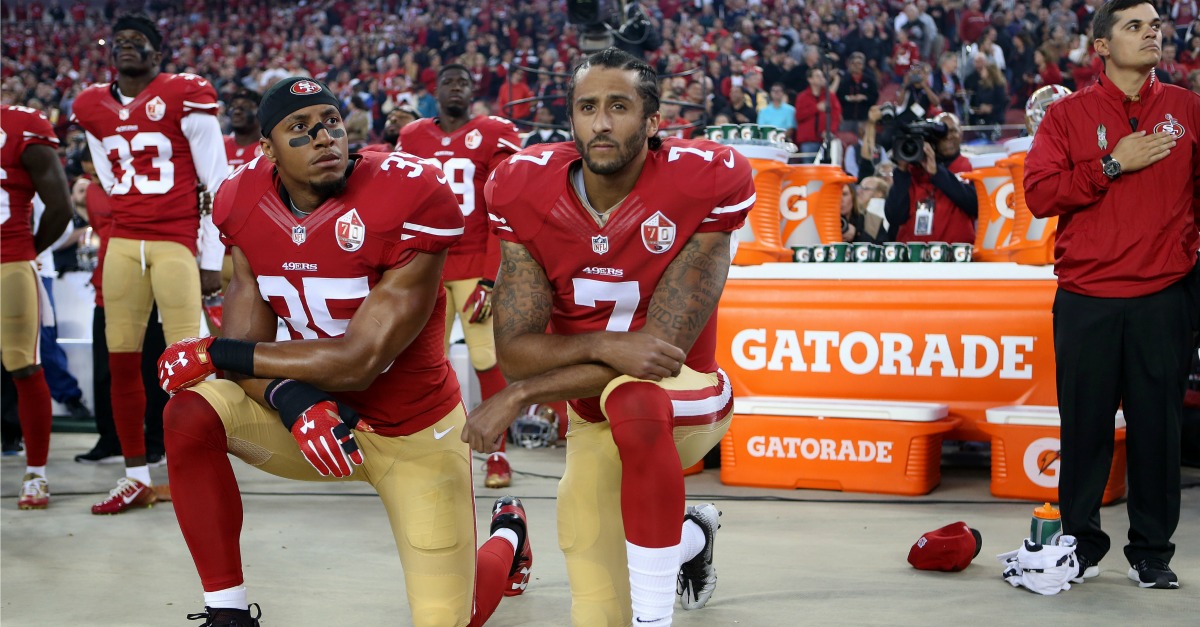One the strangest responses to the brouhaha over President Trump and his attacks on pro athletes who kneel during the national anthem to protest police brutality came from White House Press Secretary Sarah Huckabee Sanders.
Videos by Rare
“I think if the debate is really for [the athletes] about police brutality,” she said at a press conference Monday, “they should probably protest the officers on the field who are protecting them instead of the American flag.”
When questions ensued over whether Sanders was encouraging the players to somehow protest individual police officers at NFL games, she tried to clarify. “I was, kind of, pointing out the hypocrisy of the fact that, if the goal is and the message is that of that police brutality, which they’ve stated, then that doesn’t seem very appropriate to protest the American flag,” she said. “I’m not sure how those two things would be combined.”
RARE POV: Football, America’s favorite weekend social space, is being corrupted by politics
To give Sanders the benefit of the doubt, perhaps she really is confused. That seems implausible for a woman of her position, but for the sake of argument, let’s go with it. Sanders’ perplexity raises two important issues: Why have the athletes chosen this method of protest? And what types of protest are considered acceptable?
On the first count, we are blessed with a wealth of explanation from the players themselves. Consider Colin Kaepernick, the NFL player who was the first to take a knee during the anthem last year. As you may recall, Kaepernick began his protest by sitting on the bench instead of kneeling. A veteran named Nate Boyer wrote an open letter to the athlete in the Army Times, applauding Kaepernick’s stand against racism but expressing his discomfort with the decision to sit on the bench.
After that letter, Kaepernick and Boyer met up. They discussed “how can we get the message back on track and not take away from the military, not take away from pride in our country,” Kaepernick later recounted. They worked together to come up with the idea of kneeling, he said, as a way to protest while honoring the flag.
Other athlete protesters have made the same point: They aren’t taking a knee to be disrespectful to the flag, the troops, or anything else. On the contrary, they’re trying to be good stewards of their unusual fame and fortune with a protest that’s unmistakable but not disruptive.
“The point of my kneeling is not to disrespect our military; it’s not to disrespect our Constitution; it’s not to disrespect this country,” explained Oakland A’s catcher Bruce Maxwell, the first MLB player to take a knee. “My hand over my heart symbolizes the fact that I am and I’ll forever be an American citizen, and I’m more than grateful to be here. But my kneeling is what is getting the attention because I’m kneeling for the people that don’t have a voice.”
As Sanders can surely appreciate, this is a far more thoughtful and polite way to protest than somehow harassing whatever police officers are assigned to stadium duty. It recognizes the big picture of police brutality — that it’s a systemic, nationwide problem going beyond any individual cops.
And that brings me to the second issue at hand, which is what protests are deemed legitimate. Though it has been raised afresh by Trump’s comments this week, it is not a new question. In fact, it was central to Martin Luther King, Jr.’s famous Letter from a Birmingham Jail, which includes a powerful critique of “the white moderate, who is more devoted to ‘order’ than to justice; who prefers a negative peace which is the absence of tension to a positive peace which is the presence of justice; who constantly says: ‘I agree with you in the goal you seek, but I cannot agree with your methods of direct action’ … who constantly advises the Negro to wait for a ‘more convenient season’.”
RARE POV: Trump is such a snowflake
King’s words ring all too familiar today. “I oppose racism,” critics say, “but I cannot agree with your methods” of kneeling during the anthem.
Here’s the thing: Protest is meant to be noticed. It’s meant to grab your attention. It’s meant to stand out and make you think about topics you might otherwise ignore.
And given those goals, taking a knee is about as mild as it gets. It’s not violent or loud. It doesn’t interrupt anyone’s schedule or cost taxpayers any money. It doesn’t require anything of anyone but that we notice in the moment that some athletes have decided to put their celebrity to substantive good use, raising awareness about injustice that has for too long gone unnoticed.
If, like Sanders, we focus on nitpicking the method, we’re missing the point.
[anvplayer video=”4183042″]



